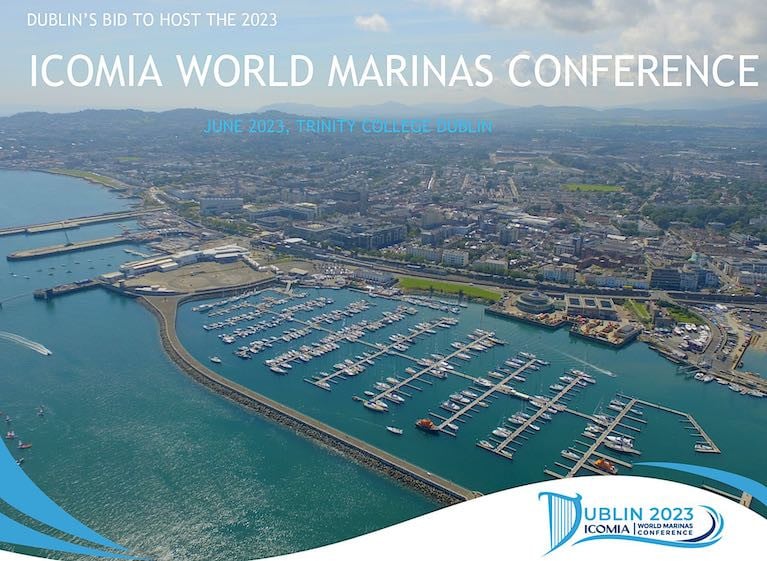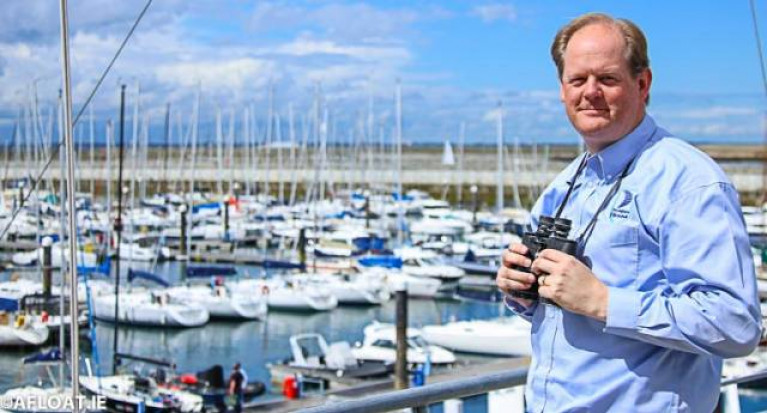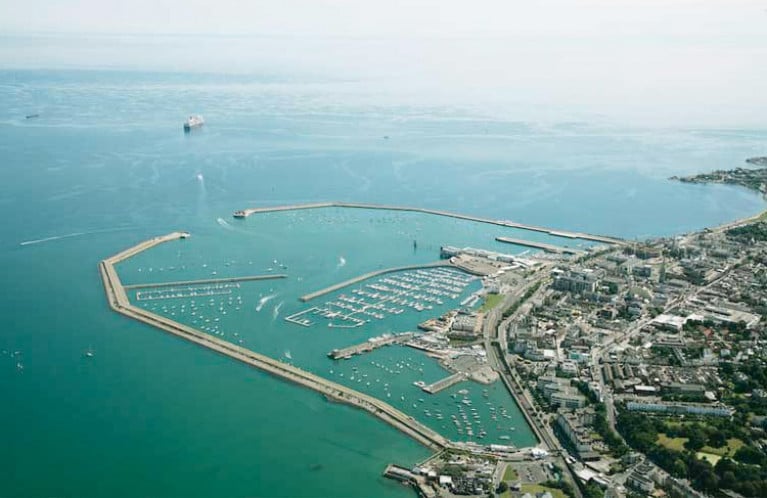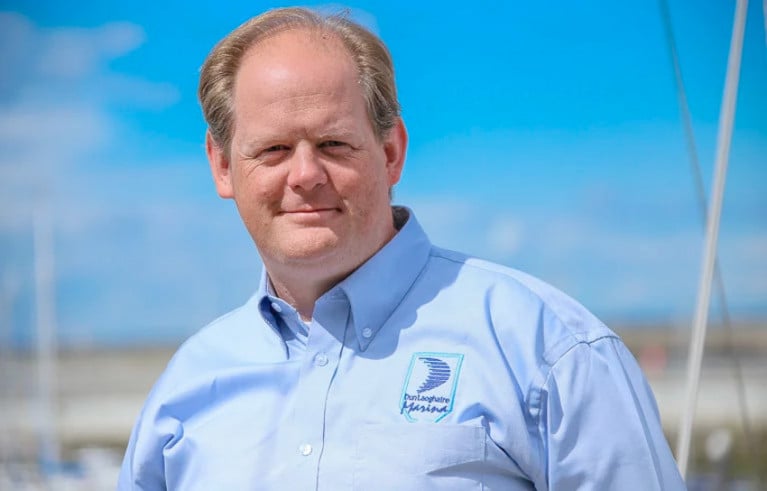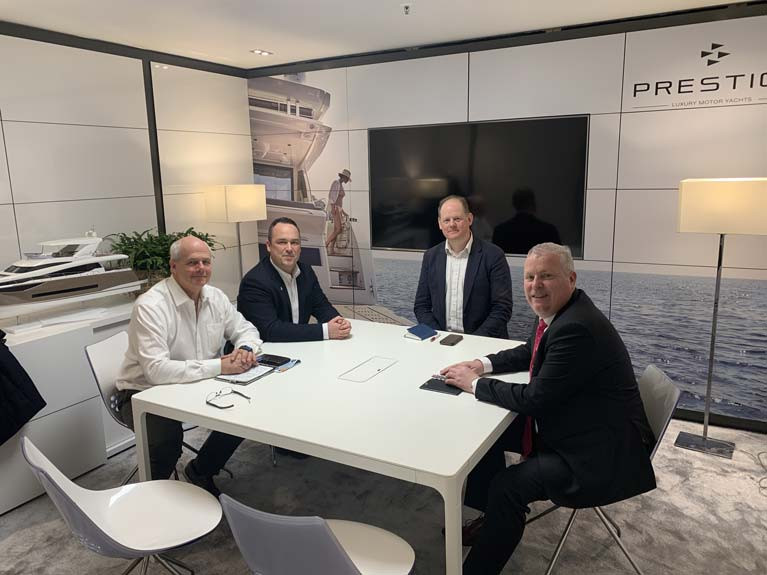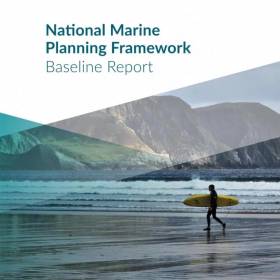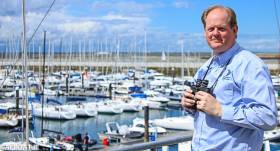Displaying items by tag: Irish Marine Federation
Ireland Bids to Host ICOMIA 2023 World Marina Conference
The Irish Marine Federation (IMF) has made its first-ever bid to stage ICOMIA's World Marina Conference in Dublin in 2023.
The marine leisure trade body, that also represents Irish Marina Operators, is up against stiff competition from rival bids in Villamoura in Portugal and also Tampa, Florida.
Up to 400 delegates would be involved in the high-level conference that includes site visits to key Irish marina facilities.
If successful, the IMF wants to use the conference as both a showcase for the potential of the fledgeling Irish Marine industry to an international audience but also use the three-day event as a means of lobbying local government to support the domestic initiatives around the coast.
The Irish marine sector has developed from small-scale boat building and boat rentals to award-winning marinas, international pontoon manufacturers and a major hub for cruising boats and superyachts.
 IMF Chairman Paal Janson is leading the Irish bid to bring the World Marina Conference to Dublin in 2023
IMF Chairman Paal Janson is leading the Irish bid to bring the World Marina Conference to Dublin in 2023
The Irish bid, led by IMF Chairman Paal Janson, who is also General Manager of Ireland's biggest marina at Dun Laoghaire Harbour, has been supported by relevant Government Departments and other state agencies including Failte Ireland who assisted in the preparation of Ireland's presentation.
The Irish bidders are hoping that as many delegates will never have been to Ireland before there will be a 'Dublin city bounce' as the capital is a much sought after conference location.
The Irish Marine Federation joined boating industry voices in Brussels today in an online meeting to give the EU a better understanding of the issues faced by the Irish marine industry and Irish sailing and boating alike in the wake of COVID-19.
The meeting came just days after the European Commission presented its long-awaited proposal for the EU recovery plan when an unprecedented €750 billion recovery fund was announced.
The 'very useful and constructive meeting' was held between Ambassador Maeve Collins, Ireland's Deputy Permanent Representative to the European Union, Attaché Dymphna Keogh (Maritime Affairs), Philip Easthill, Secretary General of the European Boating Industry and Paal Janson, Chairman of the Irish Marine Federation.
 Paal Janson, Chairman of the Irish Marine Federation
Paal Janson, Chairman of the Irish Marine Federation
Ambassador Collins was apprised of the scale of the marine leisure industry from a European perspective as well as the significance and reliance of the marine tourism sector by Irish coastal communities. A productive discussion from both an EU perspective and a more focused national level was had with examples raised and examined of practical issues faced by industry and public alike.
At the meeting Maritime Affairs Attaché Dymphna Keogh confirmed that she will pass on the relevant parts of the discussion to the Irish interdepartmental Marine Coordination Group to give a better understanding of the issues faced by Ireland's marine SMEs and sailors alike.
"This meeting was a great example of how, despite the current Covid19 pandemic, these connections can still be made and maintaine" Janson told Afloat.
"The message of the Irish Marine Federation together with our colleagues in the European Boating Industry was brought to the attention of policy makers and public representatives", he added.
Irish Marine Federation Gives 'Cautious Thumbs-Up' to the Resumption of Recreational Boating
The Irish Marine Federation has given a cautious thumbs-up to the resumption of recreational boating in line with the Government's COVID-19 Restrictions 'Roadmap'.
In a statement, the IMF, the national organisation representing both commercial and leisure sectors of the marine industry in Ireland, says it has been working with Government, industry and marine trade associations worldwide during the Covid19 pandemic to ensure that our members are kept informed of the necessary measures to help to come through this most difficult of times.
With the publication of the Roadmap for reopening society and business last week, the IMF believes that the time for safe and responsible recreational boating is very near.
Internationally it has shown that it is possible for family-units to return to outdoor recreation in compliance with both medical and government guidelines. In addition, boats require regular safety and maintenance checks which can be best carried out by owners or qualified contractors.
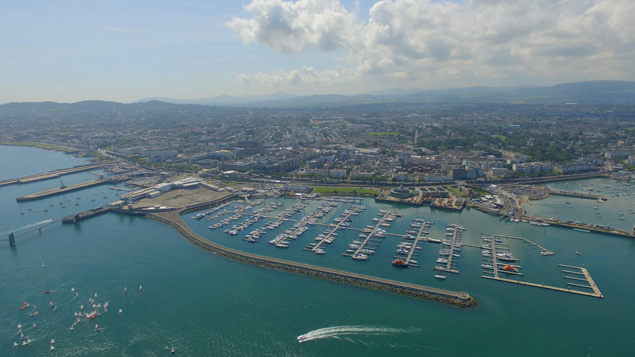 Ireland's largest marina at Dun Laoghaire Harbour is a member of the Irish Marine Federation (IMF) and the Irish Marina Operators Association (IMOA)
Ireland's largest marina at Dun Laoghaire Harbour is a member of the Irish Marine Federation (IMF) and the Irish Marina Operators Association (IMOA)
The IMF says it is strongly encouraged that these actions can be carried out in accordance with the government roadmap and that Monday, May 18th is the earliest date at which there should be a limited return to recreational boating. The government guidelines are clear and restrictions such as travel distances must be adhered to for the greater public good.
As part of the industrywide promotion of recreational boating, the IMF and its members will support the international #back2boating campaign to encourage marine recreation once again with the easing of Covid19 restrictions.
The IMF says it will continue to monitor the situation and make further updates as appropriate in line the Government's Roadmap for reopening society and business.
Call For Government To Consider Marine Sector’s Small Traders In Any Easing Of Covid-19 Restrictions
The Irish Marine Federation (IMF) has called on the Government to consider easing some restrictions currently imposed on the marine sector amid the Covid-19 pandemic response.
In an letter to Brendan Griffin TD, Minister of State for Tourism and Sport, as seen by Afloat.ie, IMF chairman Paal Janson suggests “some responsible steps” to allow small businesses within the sector to resume limited trading “in light of the considerations now being given” to a gradual easing of movement restrictions.
These steps would allow for the pick-up of a boat or boat equipment from a dealer, broker or seller “as it is considered a reasonable justification under obtaining goods and services”.
They would also allow a boat-owner to access their vessel at a marina or mooring “to male sure it is safe and compliant”, or to take their vessel to a marina or boat shed for repairs or servicing (or likewise return it to its mooring it after same).
“In addition, we would suggest that once recreational activities are once again permissible, boating is one of the more responsible and acceptable forms of enjoying the outdoors,” Janson says, provided boaters stick to the following:
- Only boat with those already in your immediate household. No guests on your boat.
- Go right from your house to the boat and back, no unnecessary contact with anyone or any loitering at the marina/dock.
- Maintain your distance at the fuel dock and when purchasing provisions.
- No rafting up, keep your distance when out on the water.
- Wash your hands any time there is contact with shared surfaces.
- Be safe and responsible, do nothing that would require the assistance of the rescue services.
“The Irish Marine Federation is committed to ensuring that the safety of its members and customers alike is of overarching importance and hopes to be able to work with the relevant Government authorities to see a gradual return to a safe and responsible recreational activity,” Janson adds.
The Irish Marine Federation (IMF) has joined a call by European boating industry associations for support from the EU to address the Covid-19 outbreak and its profound effects on the sector.
Eighteen associations have signed a policy paper from the European Boating Industry (EBI) which outlines a series of suggested responses “to ensure that companies survive the crisis and can secure jobs” — jobs which, it says, number some 280,000 in 32,000 companies across the EU.
These responses include the introduction of a voucher scheme for tourism activities, open borders for goods and deliveries, as well as a risk-based approach to restarting marinas, production and tourism in anticipation of the summer season.
EBI also calls for “strong communication from the European Commission and national governments to inspire consumer confidence in the safety and attractiveness of maritime tourism”.
Regarding the local situation in Ireland, the IMF says it has opened channels of communication with the HSE with relation to the marine sphere “and the many issues that exist within our industry”.
Information on business supports is available from the Government and from Fáilte Ireland, the federation advices.
And following its call for marine industry staff to be recognised as essential workers, the federation refers to its response from the office of Business Minister Heather Humphreys with a guidance list of services deemed essential.
The IMF recommends that any specific queries in relation to Covid-19 and measures to mitigate its impact on the maritime transport sector should be sent to [email protected]
“I think it is fair today that the business situation is foremost in all our minds and what we can do to continue trading, in whatever capacity, to keep the light on over the door until we come out the other said,” said chairman Paal Janson in a letter to IMF members.
In the meantime, the IMF says it is in regular contact with industry associations, as well as marina owners and operators, the world over “in an effort to understand the issues that marine industries in other countries are going through and any relevance that may have to us in Ireland”.
Janson added: “The federation will continue to work on [members’] behalf and do whatever it can to support its members and help them through this difficult time.”
The EBI policy paper is attached below.
Irish Marine Federation Calls For Marine Industry Staff To Be Classified ‘Essential Workers’
Following today’s (Tuesday 23 March) announcement of further restrictions to combat the spread of Covid-19, the Irish Marine Federation has called for marine industry staff to be classified as ‘essential workers’.
Taoiseach Leo Varakdar announced a slate of new measures on top of existing restrictions, which have been extended from this Sunday 29 March to Sunday 19 April.
These include limiting unnecessary travel, the cancellation of all sporting events and the shutting of ‘clubs’ — though it is not clear if yacht clubs and similar fall under this distinction.
Earlier today Bangor Marina announced its closure following severe lockdown restrictions confirmed by UK Prime Minister Boris Johnson, and its expected all other marinas and boating facilities in Northern Ireland and Great Britain will follow suit.
Meanwhile, Irish Marine Federation chairman Paal Janson has contacted the ministers for transport, trade and the marine on behalf of marina and boatyard operators here “to ensure that our sector is not left out when any guidelines or legislation is drawn up to limit travel and when they are defining ‘essential workers’”.
Janson, who is also general manager of Dun Laoghaire Marina, said: “Many of us will have a requirement to maintain access for emergency services and State Agencies, as well as looking after our customers' boats and marina/boatyard facility.
“We do not have the option to work from home, so we should not be forced to shut our doors.
“Through our membership of ICOMIA (the International Council of Marine Industry Associations), I am in contact with other marina operators around Europe (and the world) and am keeping abreast of what other countries are imposing on their domestic industries.
“I would encourage our own membership to keep in contact with the group and discuss the plans and implementations that are being carried out to protect staff and customers.”
Irish Marine Federation Discusses Marina Initiatives at Boot Dusseldorf
An Irish Marine Federation committee meeting held at Boot Dusseldorf last week discussed future European tie-ups with the massive German show as a result of Brexit and the loss of the London Boat Show, traditionally a show with a strong Irish following.
The Irish marine trade has witnessed increasing numbers of Irish attendees at Boot over the last few years as the 17-Hall show becomes more and more dominant in the European market and direct flights from Dublin offer the possibility of day trips to the river Rhine venue.
The IMF meeting, chaired by Paal Janson of Dun Laoghaire Marina discussed implications for green diesel cessation and also on the agenda were plans to develop the valuable marina tourism network around Ireland.
The Irish Marine Federation are representing their members through a number of key initiatives including some significant partnerships with international organisations.
Irish Marine Federation Welcomes Public Consultation On Draft Marine Planning Policy Statement
Feedback from the public and interested stakeholders is being sought on the Government’s Marine Planning Policy Statement by Friday 9 August.
The statement sets out efforts to bring marine planning “into the mainstream of Government functions” as issues surrounding land use, climate change and more come into greater focus.
Earlier this year, it was reported that more than half of submissions in the public consultation on the National Marine Planning Framework Baseline Report concerned the marine environment.
In its own submission, the Irish Marine Federation said barriers to investment and sustainability around the Irish coastline have for “took long stymied growth in the marine sphere”.
The trade body’s chair Paal Janson says its members voices are being heard at regular meetings with Minister of State Damien English in The Custom House, and he looks forward to incorporating feedback from its members on the policy statement consultation draft, which is attached below.
Marine Environment Raised By More Than Half Of Submissions On New Planning Framework
More than half of submissions (53%) in the public consultation on the National Marine Planning Framework Baseline Report concerned the marine environment.
Ports and shipping (44%), climate change (42%) and nature conservation (41%) were other important topics raised among the 173 submissions received by the Department of Housing, Planning and Local Government from a wide range of stakeholders.
Published late last year, the baseline report aimed to bring together a clear picture of all activity in Ireland’s seas for the first time.
As previously reported on Afloat.ie, representatives from all key sectors comprise an advisory group overseeing the process.
In its preliminary analysis of responses, the department also identified renewable energy, aquaculture and fisheries, seaweed harvesting, cultural heritage and assets, and consents and licensing as other areas of importance to a cohort of stakeholders that runs from public sector bodies to local authorities, coastal community groups and sports bodies.
One of the key questions asked of respondents regarded Ireland’s future approach to spatial designation marine planning, with the vast majority of the 57 who expressed a preference opting for either a policy-led plan (44%) or a hybrid of policy and zoning (40%).
The proposal for a National Marine Planning Framework has been broadly welcomed by respondents, with the Irish Marine Federation (IMF) describing it as “the most significant shift in Irish marine policy for several decades” while adding that the economic contribution of sport and recreational boating, including marine tourism, has thus far been largely underestimated, and related policy should be fully integrated in any plan.
The IMF also raised the question of spatial planning in relation to Brexit, with lack of resolution of boundary issues over the likes of Lough Foyle and Carlingford Lough “a matter of great concern”.
All responses to the public consultation have been collected HERE.
Irish Marine Federation Appoint Paal Janson as Chairman
Paal Janson has been elected as the Chairman of the Irish Marine Federation (IMF), the trade body representing marine leisure interests in Ireland.
In one of his first roles, Janson (43) has framed the IMFs submission to the Government's Marine Spatial Plan, a proposed piece of legislation for the Irish coast that may yet impact on how marine leisure businesses operate on the foreshore, including a necklace of 60 marinas around Ireland.
Janson, who is the General Manager of Ireland's largest marina at Dun Laoghaire on Dublin Bay, is a Nautical Science Graduate from Cork CIT.



























